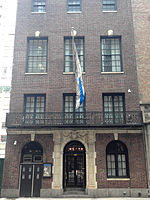French Institute Alliance Française
1898 establishments in New York CityAlliance FrançaiseEducational institutions established in 1898French-American culture in New York City
French Institute Alliance Française (FIAF) is a 501(c)(3) not–for–profit organization incorporated in the State of New York. Its mission is to enhance the knowledge and appreciation of French and Francophone culture, to increase the knowledge of the French language, and to encourage interaction among French, Francophone, and American people through programs in education and the arts.
Excerpt from the Wikipedia article French Institute Alliance Française (License: CC BY-SA 3.0, Authors).French Institute Alliance Française
East 59th Street, New York Manhattan
Geographical coordinates (GPS) Address Nearby Places Show on map
Geographical coordinates (GPS)
| Latitude | Longitude |
|---|---|
| N 40.763494444444 ° | E -73.970852777778 ° |
Address
Delmonico Plaza
East 59th Street 55
10022 New York, Manhattan
New York, United States
Open on Google Maps








